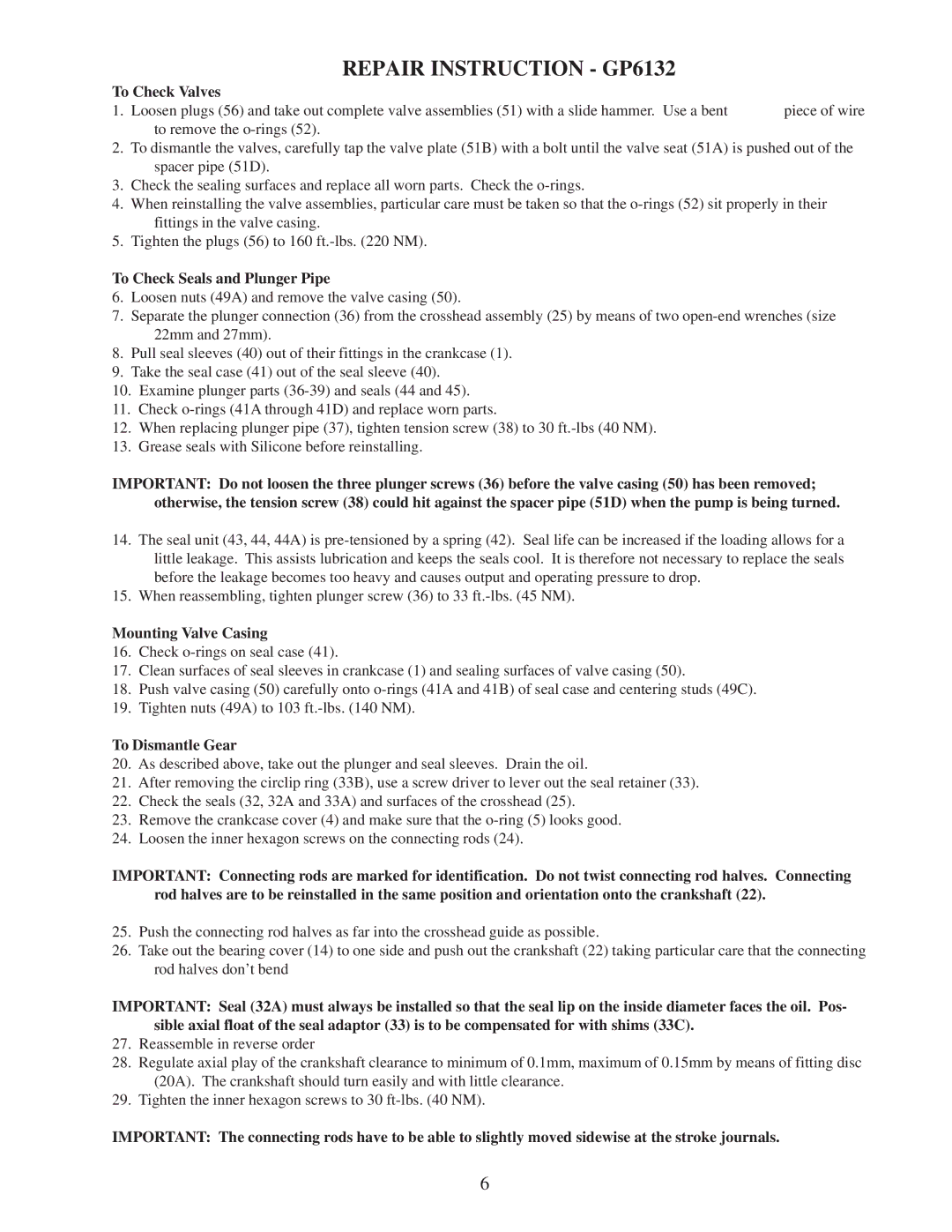REPAIR INSTRUCTION - GP6132
To Check Valves
1. Loosen plugs (56) and take out complete valve assemblies (51) with a slide hammer. Use a bent piece of wire to remove the
2.To dismantle the valves, carefully tap the valve plate (51B) with a bolt until the valve seat (51A) is pushed out of the spacer pipe (51D).
3.Check the sealing surfaces and replace all worn parts. Check the
4.When reinstalling the valve assemblies, particular care must be taken so that the
5.Tighten the plugs (56) to 160
To Check Seals and Plunger Pipe
6.Loosen nuts (49A) and remove the valve casing (50).
7.Separate the plunger connection (36) from the crosshead assembly (25) by means of two
8.Pull seal sleeves (40) out of their fittings in the crankcase (1).
9.Take the seal case (41) out of the seal sleeve (40).
10.Examine plunger parts
11.Check
12.When replacing plunger pipe (37), tighten tension screw (38) to 30
13.Grease seals with Silicone before reinstalling.
IMPORTANT: Do not loosen the three plunger screws (36) before the valve casing (50) has been removed; otherwise, the tension screw (38) could hit against the spacer pipe (51D) when the pump is being turned.
14.The seal unit (43, 44, 44A) is
15.When reassembling, tighten plunger screw (36) to 33
Mounting Valve Casing
16.Check
17.Clean surfaces of seal sleeves in crankcase (1) and sealing surfaces of valve casing (50).
18.Push valve casing (50) carefully onto
19.Tighten nuts (49A) to 103
To Dismantle Gear
20.As described above, take out the plunger and seal sleeves. Drain the oil.
21.After removing the circlip ring (33B), use a screw driver to lever out the seal retainer (33).
22.Check the seals (32, 32A and 33A) and surfaces of the crosshead (25).
23.Remove the crankcase cover (4) and make sure that the
24.Loosen the inner hexagon screws on the connecting rods (24).
IMPORTANT: Connecting rods are marked for identification. Do not twist connecting rod halves. Connecting rod halves are to be reinstalled in the same position and orientation onto the crankshaft (22).
25.Push the connecting rod halves as far into the crosshead guide as possible.
26.Take out the bearing cover (14) to one side and push out the crankshaft (22) taking particular care that the connecting rod halves don’t bend
IMPORTANT: Seal (32A) must always be installed so that the seal lip on the inside diameter faces the oil. Pos- sible axial float of the seal adaptor (33) is to be compensated for with shims (33C).
27.Reassemble in reverse order
28.Regulate axial play of the crankshaft clearance to minimum of 0.1mm, maximum of 0.15mm by means of fitting disc (20A). The crankshaft should turn easily and with little clearance.
29.Tighten the inner hexagon screws to 30
IMPORTANT: The connecting rods have to be able to slightly moved sidewise at the stroke journals.
6
